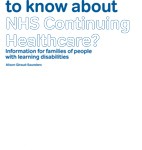
Understanding the sources of funding to support disabled people can be a confusing business, but this helpful booklet from the foundation for people with learning disabilities is a useful addition to reducing that confusion. It focuses on continuing healthcare, a particular pot of money with some very specific rules governing how and on whom it can be spent.
The booklet is aimed at families of people who may be in the throes of a continuing healthcare assessment and sets out to explain the rules and identify questions that might be asked about the funding.
NHS Continuing Health Care funding (CHC) is funding for a complete package of health and social care paid for by the NHS.
However, as the booklet points out, it is only for those people assessed as having a ‘primary health need’. The NHS has a clear system for making that assessment which provides a decision about whether someone is eligible for the CHC funding.
The authors of booklet point out that although this is a funding assessment, if it is found that the individual is eligible for CHC funding, then the planning done to spend that money on support must still be done in a person centred way and involve family members.
They also point out that CHC funding can be allocated as a personal health budget, and from 2014 it should be possible to ask for this funding to be given as a direct payment
The booklet is mainly about continuing healthcare rules for adults, as the system is different for children and young people.
The questions in the booklet cover:
- The definition of the funding
- Capacity and consent
- How assessments work
- What to do if the assessment finds a person not eligible
- What happens when a person is eligible
- How to complain or appeal
- Some specific life situations
The booklet also contains links to a range of useful resources
Download the booklet here: What do I need to know about NHS Continuing Healthcare? Foundation for people with learning disabilities
